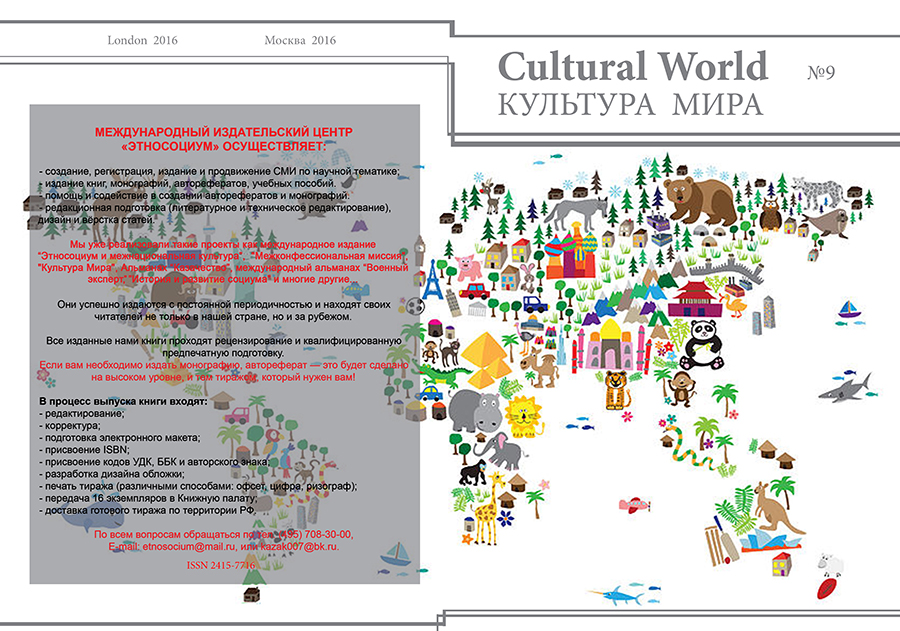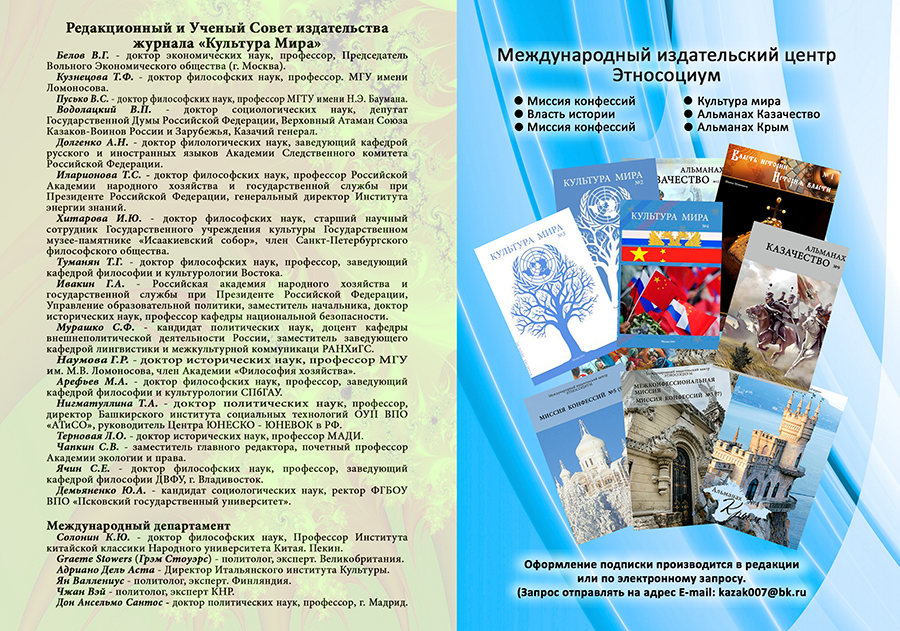
Cultural World №9
Ryabova E.L., Chief Editor, Doctor of Political Sciences, Professor.
The Council of Reviewers of the publishing house together with the teaching staff of leading universities:
The main criteria of our choosing materials for publishing is their high scientific level. The main principle of the publishing house is to accept pluralism of views if authors present their points of view in a well-argued manner. The author’s view point does not have to coincide with the editors’ view points.
The authors of submitted materials are responsible for the accuracy of facts, quotations, dates, events, geographical and proper names.
If you use any materials from the journal, you are to give a relevant reference to it.
All the submitted materials are reviewed.
Journal's Editorial Board
Belov V.G., Doctor of economic sciences, Professor, Chairman of the Free Economic Society (Moscow).
Kuznecova T.F., Doctor of Philosophical Sciences, Professor of Lomonosov Moscow State University.
Pusko V.S., Doctor of Philosophical Sciences, Professor of the Bauman Moscow State Technical University.
Vodolackiy V.P., Doctor of Social Sciences, Deputy of the State Duma of the Russian Federation, Supreme Ataman of the Union of Cossacks of Russia and abroad Warriors, Cossack General.
Dolgenko A N., Doctor of Philology, Head of the Department of the Russian and Foreign Languages of the Academy of the Investigative Committee of the Russian Federation.
Ilarionova T.S., Doctor of Philosophical Sciences, Professor of The Russian Presidential Academy of National Economy and Public Administration, General Director of the Institute of energy of knowledge.
Hitarova I.U., Doctor of Philosophical Sciences, senior researcher, employee of the State institution of culture the Museum Complex The State Museum St Isaac’s Cathedral, a member of Saint-Petersburg philosophical society.
Tumanyan T.G., Doctor of Philosophical Sciences, Professor, Head of Department of Oriental Philosophy and Cultural Studies.
Ivakin G.A., The Russian Presidential Academy of National Economy and Public Administration, management of educational policy, Deputy Head, Doctor of Historical Sciences, Professor of the Department of National Security.
Murashko S.F., Candidate of political sciences, Associate Professor of Russia's foreign policy, Deputy Head of the Department of Linguistics and Intercultural Communication of the Russian Presidential Academy of National Economy and Public Administration.
Naumova G.R., Doctor of historical sciences, Professor of the Lomonosov Moscow State University, Member of the Academy "Philosophy of Economy".
Arefev M.A., Doctor of Philosophical Sciences, Professor, Head of Department of Philosophy and Cultural Studies.
Nigmatullina T.A., Professor, Director of the Bashkir Institute of Social Technologies PMO VPO of the Academy of Labor and Social Relations, Head of UNESCO Centre in Russia.
Ternovaya L.O., Doctor of historical Sciences, Professor of the Moscow Automobile and Road Construction University.
Chapkin S.V., Deputy Chief Editor, Honorary Professor of the Academy of Ecology and Law.
Yachin S.E., Doctor of philosophical sciences, Professor, Head of the Department of Philosophy FEFU, (Vladivostok).
Demyanenko Y.A., Candidate of sociological sciences, Rector of VPO Pskov State University.
International Department
Solonin K.Y., Doctor of Philosophy, Professor of the Institute of Chinese classics, Chinese People’s University. Beijing.
Graeme Stowers, political expert (United Kingdom).
Adriano Del Asta, Director of the Italian Cultural Institute.
Yan Vallenius, political expert. (Finland).
Chjan Vei, political scientist, expert of China.
Don Anselmo Santos, Doctor of Political Sciences, Professor, Madrid.
Contents
|
UNESCO: arts and culture, national traditions
|
|
|
Ermakov V.M., Antsiferova N.G. The dialectics of social development
|
4
|
|
Janteeva J.S. Media communications of ethno-political actors in the North Caucasus
|
8
|
|
Ryabova E.L., Ternovaya L.O. The universal language of mankind: communication codes of folk dance
|
15 |
|
International relations
|
|
|
Honali K. A point of view on socio-cultural state
|
29
|
|
Human rights
|
|
|
Biryukov S.V., Kovalenko A.A. Eurasianism as an ideology and a variant of political strategy
|
35
|
|
Vlasov V.I., Smirnova M.I. Anatomy of love and mercy
|
44
|
|
Galaganova S.G. “Axiology of righteousness”: a concept of justice in Russian culture
|
50 |
|
Leon Conrad Journalism and Human Rights: Bringing Light and Right Right into Being
|
59 |
|
Brik T.A. IgroMir and Russian ComicCon
|
68 |
|
Abstracts
|
71
|
|
Authors
|
78
|
Abstracts
Ermakov V.M.
Antsiferova N.G.
The dialectics of social development
The article is devoted to the contradictory nature of management. We attempt to classify conflict management activities according to their reasons. We also raise a number of questions related to the search of ways to resolve administrative problems caused by contradictory actions.
Keywords: difference, contrast, cooperation, conflict management, conflict, antagonism.
Janteeva J.S.
Media communications of ethno-political actors in the North Caucasus
The author analyzes the features of ethnopolitical media communications in the North Caucasus, focusing on the fact that in case of their establishment, it is necessary to possess some knowledge of cultural and identification processes in the region, knowledge of information and communicative opportunities as well as ethnic identification of communicants and evolution of the media audience. It is argued that tolerant communicative behavior is the principal factor for efficiency in ethnopolitical communications in North Caucasus Federal District (hereafter – NCFD).
Keywords: ethnopolitical media communications, ethnopolicy mediatization, media impact, media audience evolution, tolerant communicative behavior, North Caucasus, NCFD.
Ryabova E.L.
Ternovaya L.O.
The universal language of mankind: communication codes of folk dance
In addition to regular languages as a means of verbal communication, mankind has a lot of non-verbal communication means. Dance is one of the most beautiful and challenging among them, because it combines a language of gestures, movements, music and costume. Folk dances can be considered as a meaningful statement of the nature of a particular ethnic community, characteristics of labor and festive life of a people. But just as endangered languages, dances disappear. Therefore, efforts are being made to preserve and transfer the culture of folk dance to the next generation.
Keywords: dance, ritual, folk culture, dance ensembles, festivals.
Honali K.
A point of view on socio-cultural state
The article reveals the content of the concept of "socio-cultural state" through the prism of history, social, political and cultural studies. The author identifies the main features of this state type by the initial differentiation of the terms "state of law", "social state", "cultural state" and the subsequent connection of these definitions. Taking into account the discovered distinctive properties and indices of democracy and human development, the ranking of countries in terms of happiness, and also the selected characteristics of the state of affairs in the world, the author makes a conclusion about the absence on the world map of a state, which could be characterized as "socio-cultural" even among highly developed countries. It is argued that this fact opens a boundless prospect of evolution. In the material some of the position of the Russian Federation are highlighted in the studied aspect.
Keywords: social state, cultural state, socio-cultural state, democracy index, human development index, a ranking of countries in terms of happiness, humanism, morality, safety, freedom, social equality.
Biryukov S.V.
Kovalenko A.A.
Eurasianism as an ideology and a variant of political strategy
The article considers the history and development of Eurasianism as an original political ideology and a specific direction of a political thought. We analyze the original content of neo-Eurasianism and emphasize its substantial differences from the classical version of the Eurasian doctrine. The authors consider the modern modifications of Eurasianism related to justification of the process of Eurasian integration and the creation of the Eurasian Union.
Keywords: Union, Europe, analytics, modern, modification, people, culture, integration.
Vlasov V.I.
Smirnova M.I.
Anatomy of love and mercy
Anatomy is a science of the form and structure of individual organs, systems and the whole organism. There is human anatomy (anthropotomy), animal anatomy (zootomy), anatomy of plants (fetotomy). These are the basic terms in anatomy. But anatomy is also understood in a broader sense as the science of the structure of anything at all, for example the society. But is there a structure of love? To answer this question, we need to clarify many things, namely: a) that love means; b) what the qualities of love are; c) what the effect of love is.
Keywords: charity, love, development, anatomy, history, peace, relationships, communication, time.
Galaganova S.G.
“Axiology of righteousness”: a concept of justice in Russian culture
The concept of justice (“the Righteousness of God”) is argued to acquire religious content in Russian culture, thus becoming its basic value and a system-forming factor. Based on the Orthodox Christian ethics, the Russian idea of justice is described as sweeping far beyond the idea of a lawful state and absorbing key commandments of the New Testament.
Keywords: Russian culture, values, justice, social justice, righteousness, Righteousness of God, Russian schism, Russian old-believers.
Leon Conrad
Journalism and Human Rights: Bringing Light and Right Right into Being
This article seeks to outline a link between true journalism and the jus natural which underlies the notion of human rights. It argues that the link between them sustains and is sustained by the role that true journalists play in society, within the boundaries of a free press, regulated by independent bodies which uphold agreed standards. The article argues that the way in which true journalism as a vital part of civic society can be cultivated is through cultivating a balance between fact-finding, reason, and emotional appeal on the one hand and mystery, chance, and silence on the other. With reference to Keats, Wittgenstein, Philip Pullman, and particularly George Spencer-Brown’s work, it argues that it is the cultivation of the latter qualities which lead journalists and their readers to seek and manifest the ineffable both in journalistic work and in the way it is perceived, and that the extent to which the ineffable is made manifest and brought to light is what makes true journalism worthy of the name.
Keywords: Journalism, human rights, George Spencer-Brown, Laws of Form, Keats, Wittgenstein.
Authors
Antsiferova N.G., Candidate of Sociological Sciences, Docent.
Biryukov S.V., Doctor of Political Sciences, Professor, Department of Political Science, Kemerovo State University.
Brik T.A., Chief Project Manager of "Etnosotsium", "Cultural World" Project Manager.
Ermakov V.M., Doctor of Philosophical Sciences, Professor.
Galaganova S.G., Bauman Moscow State Technical University, Department of Information Analysis and Political Technologies, Candidate of Philosophical Sciences, Associate Professor.
Honali K., Candidate of Historical Sciences, Rector of the State Institution "National Institute of Advanced prepodgotovki educators".
Janteeva J.S., Manager of department of socio-political researches of the Karachay-Cherkess institute of humanitarian researches in case of the Government of the Karachay-Cherkess Republic, the candidate of historical sciences, the associate professor.
Kovalenko A.A., Assistant Deputy of the State Duma of the Russian Federation.
Leon Conrad, independent researcher and co-founder and lead trainer of The Academy of Oratory Ltd.
Ryabova E.L., Doctor of political sciences, Professor, Chief Editor of “Etnosotsium” international publishing house.
Smirnova M.I., Candidate of Political Sciences.
Ternovaya L.O., Doctor of Historical Sciences, Professor MADI (The Moscow Automobile and Road Construction University).
Vlasov V.I., Doctor of legal sciences, professor.


